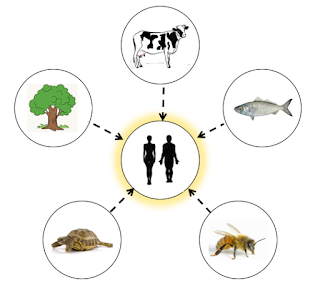Beyond anthropocentrism: Reciprocity with Nature
By Rodrigo Cáceres
In a previous article, we examined the notion of "natural resource exploitation" that is commonly used in modern societies. This analysis led us to conclude that this notion configures a worldview in which nature is to be treated as a set of objects separated from humans, that can be manipulated and exploited according to the will of humans. In this way, this worldview establishes a unidirectional relationship with nature, in which nature serves humans but humans are never at the service of nature.
We argued that this anthropocentrism and the subject-object relationship that it establishes lead modern societies to destroy nature. These two elements are values that are at the root of the current ecological crisis. The following diagram illustrates the anthropocentric view, in which humans are the only subjects having value in themselves (illuminated in yellow):
Nowadays, the notions of "ecosystem services" and the more recent one of "Nature's Contributions to People" (both stemming from modern conservation science) reproduce the same anthropocentric frame. In these cases, nature is considered mainly in terms of its utility. Namely, nature is not nature in and for itself but it is rather, and above all, a "natural resource". Simlarly, ecosystems are not ecosystems in their own right but they are rather, and above all, a set of "ecosystem services".
In this manner, nature provides different services to humans but humans do not carry a responsibility to reciprocate and "give back" services to nature. These notions also create a net separation between humans and nature, that one can note for example in the visual representations that we do for ecosystems, in which humans are pretty much always absent.
Moreover, from a semantic point of view, what is most regrettable about the idea that nature "provides services" for us is that it is far from doing justice to the fact that we owe our existence to nature and that, as humans, we are just another expression of the diversity of nature. We owe nature our existence because our species emerged from nature in the first place, and also because nature keeps us alive: through the air we breathe, the food it provides, the meaning it gives to our lives, among others. To say that nature "provides services" largely fails to communicate this fact.
The question that arises from these issues is the following: Is there any alternatives to the dominant anthropocentric view? Indeed there are, and we'll try to address them through a story.
By the end of the XXth century, a collective of twelve different North American tribes representing the seven major indigenous culture areas in the US participated in a series of gatherings and reunions, in order to identify and articulate the moral values that were common to all tribes.
These reunions had as a result the identification of four core values which cross generation, geography and tribe. Together, they articulate the notion of indigeneity. These four values are: responsibility, relationship, reciprocity and redistribution (Harris & Wasilewski, 2004). They are known also as the 4 R's. Although all of these four values are of high importance and each one of them deserves special attention, we will take a look particularly at reciprocity.
Reciprocity is the cyclical obligation. It emphasizes a fundamental principle that phenomena in nature and life are circular (Varela, 2017). For example, the cycle of seasons or the dynamics between any two entities in relationship to each other. Reciprocity implies that once we have encountered an "other", we are in relationship with him/her in a continual exchange. These exchanges may not be equitable at any given moment, but reciprocity implies a pursuit of complementarity and harmony that can mutually favor the coexistence of the beings in relation.
One can readily note that when one speaks around the notion of "reciprocity", there is a whole semantic field that unfolds before us, with the associated notions of "complementary"; "harmony"; "equitable"; "balance"; "coexistence"; "cooperation"; "mutual". These notions are largely absent from current environmental discourse in modern societies, simply because we do not think in those terms. As we have already studied, modern societies think in terms of "resources"; "exploitation"; "sustainable use"; "extraction", among others, which belong to an alternative semantic field where nature is a resource. It might seem apparent that in the frame where "nature is a resource" the notions of "reciprocity" or "harmony" will never appear.
An important consequence of this is the fact that the practices of our modern societies are not at one with a fundamental principle of the circularity of phenomena in life and nature.
In sum, the notion of reciprocity places us in an ecocentric framework, represented in the following diagram:
In this ecocentric framework, one can notice that all relationships are bidirectional, and that all relationships have value, because they are the ones that connect us to all other beings. Aditionally, all beings have value in themselves. Together, these relationships weave what is usually understood as the web of life, which gives shape and allows for the assemblage of complex unities such as ecosystems and the global biosphere.
As a conclusion, this discussion provides a lot of inspiration to put into practice concepts that can "close the circle" of a reciprocal relationship with nature. The application of notions such as reciprocity and its associated concepts are potentially capable of moving beyond anthropocentric frames that are dominant in our modern societies. These alternative discourses can effectively inspirit and boost the transition to an ecocentric paradigm of thought and practice, and they can be encouraged through science and policies for the protection of nature.
References
References
Harris, L. D., & Wasilewski, J. (2004). Indigeneity, an alternative worldview: Four R's (Relationship, Responsibility, Reciprocity, Redistribution) vs. two P's (power and profit). Sharing the journey towards conscious evolution. Systems Research and Behavioral Science: The Official Journal of the International Federation for Systems Research, 21(5), 489-503.
Varela, F. J. (2017). Le cercle créateur. Écrits (1976-2001). Éditions du Seuil.






Comments
Post a Comment